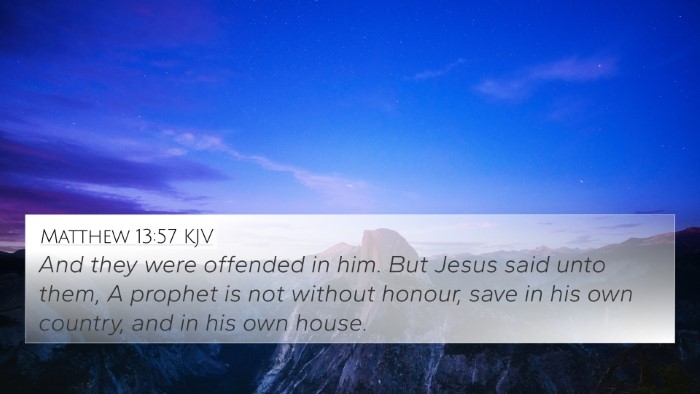Understanding Luke 4:24
Verse Text: "And he said, Verily I say unto you, No prophet is accepted in his own country."
Luke 4:24 presents a poignant statement made by Jesus regarding the nature of prophetic ministry and the often lukewarm reception that prophets receive from their own communities. This verse is part of a larger discourse where Jesus begins to teach in the synagogue at Nazareth, His hometown. The meaning and implications of this verse can be understood through the lens of various public domain commentaries.
Summary of Commentary Insights
- Matthew Henry: Henry emphasizes that Jesus' statement reflects a profound truth about human nature, demonstrating how familiarity can breed contempt. He points out that although Jesus performed miracles and shared profound teachings, His own people failed to recognize His divine authority and mission.
- Albert Barnes: Barnes highlights the prophetic rejection theme throughout the Bible, suggesting that even the most significant messages delivered by God's messengers can be disregarded by those closest to them. He notes that the statement reflects the historical context of many prophets being unrecognized or despised in their own land.
- Adam Clarke: Clarke discusses the implications of Jesus’ assertion by linking it to Old Testament examples where prophets, such as Jeremiah and Ezekiel, experienced similar fates. He stresses that this was not merely a personal affront to Jesus but reflective of a systemic issue within Israelite history concerning the reception of God's word.
Bible Cross-References
Luke 4:24 connects with several other scriptures that highlight the theme of prophet rejection:
- Matthew 13:57: "And they were offended in him. But Jesus said unto them, A prophet is not without honour, save in his own country, and in his own house." - Reflects the same sentiment of rejection within one’s homeland.
- John 1:11: "He came unto his own, and his own received him not." - This verse correlates to the rejection Jesus faced, noting the broader implications of His mission.
- Jeremiah 11:21: "Therefore thus saith the Lord, concerning the men of Anathoth, that seek thy life, saying, Prophesy not in the name of the Lord, that thou die not by our hand." - An Old Testament example of a prophet being rejected by his own people.
- 1 Kings 18:17-18: Elijah's confrontation with Ahab provides an illustration of the animosity faced by prophets when delivering God’s messages.
- Matthew 23:37: "O Jerusalem, Jerusalem, thou that killest the prophets, and stonest them which are sent unto thee..." - Jesus mourns over Jerusalem, acknowledging its history of rejecting prophets.
- Acts 7:52: "Which of the prophets have not your fathers persecuted? And they have slain them which shewed before of the coming of the Just One..." - A reminder that God’s messengers have faced opposition throughout history.
- Luke 13:34: "O Jerusalem, Jerusalem, which killest the prophets, and stone them that are sent unto thee..." - Reinforces the idea of prophetic rejection within the holy city.
- Hebrews 11:32-38: This passage recounts the suffering of prophets and those faithful to God, highlighting their persecution.
- Matthew 5:12: "Rejoice and be exceedingly glad, for great is your reward in heaven: for so persecuted they the prophets which were before you." - Here, Jesus acknowledges the tradition of persecution faced by prophets as part of the faithful’s heritage.
- 2 Chronicles 36:16: "But they mocked the messengers of God, and despised his words, and misused his prophets, until the wrath of the Lord arose against his people..." - This passage shows the historical pattern of ignoring God’s warnings through prophets.
Thematic Connections and Insights
Through Luke 4:24, we can explore various thematic connections, such as:
- Familiarity and Contempt: The tendency of individuals to overlook the significance of familiar figures—this theme is prevalent throughout Jesus’ ministry.
- The Role of the Prophet: Understanding the calling of prophets and the expectation against the reality of their acceptance.
- Historical Patterns: Identifying the consistent narrative of prophets facing resistance, showing a pattern of human rejection across the biblical timeline.
- Messianic Fulfillment: How this rejection reflects the broader story of Jesus’ messianic role, foreshadowing His ultimate rejection and crucifixion.
- Reception of God’s Word: Engaging with the importance of how divine messages are received or dismissed, an essential part of the believer's journey.
Practical Applications
Understanding Luke 4:24 encourages believers to consider their attitude towards spiritual messages and messengers. Key takeaways include:
- Awareness of Bias: Recognizing that our familiarity with certain individuals may blind us to the truth they convey.
- Courage in Ministry: Despite the potential for rejection, the calling to share God’s word remains imperative.
- Appreciation for Prophetic Voices: Valuing voices from different contexts, even those from our own communities, can enrich our understanding of faith.
- Historical Reflection: Learning from past rejections can guide current and future responses to prophets and spiritual leaders.
Conclusion
Luke 4:24 serves as a reminder that the work of prophets is often met with skepticism, particularly from those who are familiar with them. By engaging with cross-references and exploring thematic connections, believers gain a greater understanding of the trials faced by God’s messengers and the nature of acceptance in spiritual communities.








